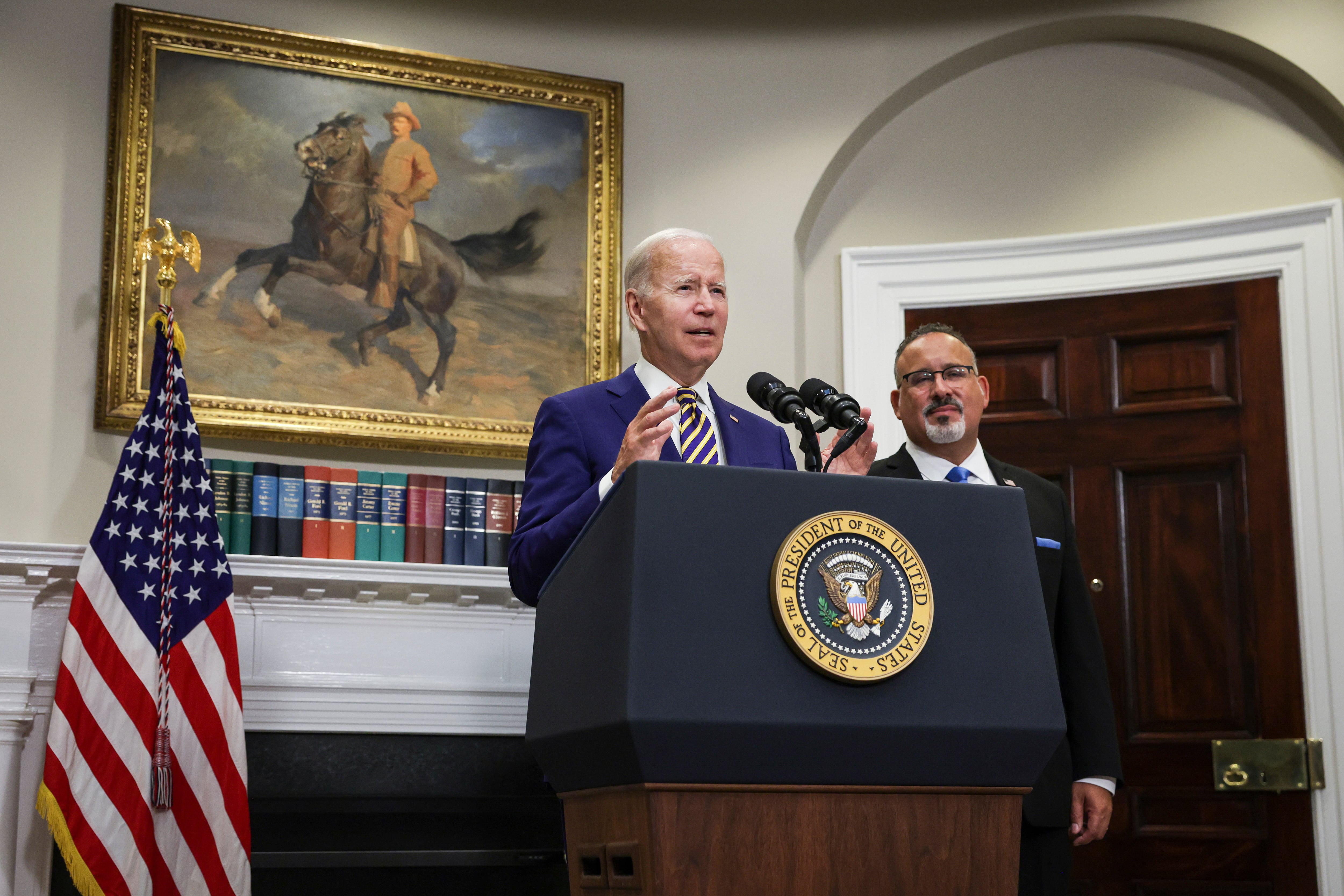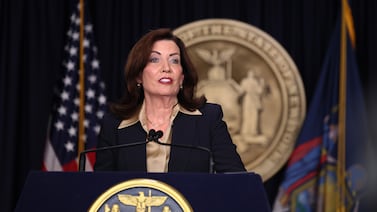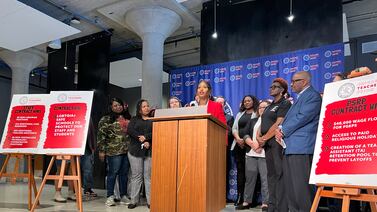Chalkbeat is a nonprofit news organization covering public education in communities across America. Sign up for our free weekly newsletter to keep up with how public education is changing.
As the country’s furious political fights engulf schools, Democrats have mostly played defense.
Many critics blamed Democrats for the extended school closures during the early stages of the pandemic, saying they put educators’ interests ahead of students’. Then Republicans cast themselves as defenders of “parents’ rights,” while accusing the left of trying to “indoctrinate” public school students.
“We were in a really bad space politically around these issues,” said Lanae Erickson, a senior vice president at Third Way, a liberal think tank that often advises the Democratic party.
But after putting up little resistance in recent years, there are some signs that national Democrats are ready to fight back.
Party leaders and their allies are piloting new messaging and proposed legislation meant to challenge Republicans’ stance as the party of parents. They are emboldened by polls showing that most parents oppose book bans and worry more about school safety than critical race theory creeping into the curriculum, and are betting that the GOP’s efforts to dictate what students learn and to restrict LGBTQ students’ rights will ultimately alienate moderate voters.
Until recently, “The Republicans felt like, ‘We can’t lose on this,’ and the Democrats felt like, ‘We can’t touch this,’” Erickson said. “That dynamic is beginning to shift.”
Democrats’ interest in a more muscular response will be tested as Republicans escalate the school culture wars ahead of the 2024 presidential election. This week, Florida expanded its ban on classroom lessons about sexuality and gender identity, which has been a top priority for likely presidential contender Gov. Ron DeSantis, and Republicans in Congress advanced new nationwide restrictions on transgender student athletes.
But among advocates who have been urging Democrats to forcefully fight back, some still question the party’s resolve.
“I think they’re doing better,” said Keri Rodrigues, co-founder and president of the National Parents Union, which generally aligns with Democrats on education. “But they’re still terrible.”
Democrats start to fight against the culture wars
The clearest example of Democrats’ new approach came last month when House Republicans proposed the Parents Bill of Rights Act, which would require every school to publish its curriculum and notify parents if a student wants to use different pronouns or restrooms. Democrats branded it the “Politics Over Parents Act” and put forward a counter-resolution, which calls for “authentic” collaboration between parents and teachers along with civil rights protections for students.
The Biden administration echoed the message. After the Republican bill narrowly passed, an education department official told Politico that GOP leaders “are focused more on playing politics than helping our parents, kids and schools.” And in an uncharacteristically forceful op-ed, U.S. Secretary of Education Miguel Cardona accused Republicans of being out of touch with families.
“Parents don’t want politicians dictating what their children can learn, think and believe,” he wrote in the Tampa Bay Times last month after Republican Gov. Ron DeSantis rejected a high school African American studies course. And in a recent interview with Politico, he declared that he will no longer “sit idly” while some lawmakers push for “book banning” and “attacking vulnerable students.”
Democrats’ allies are spreading a similar message. In a speech last month, the head of the nation’s second largest teachers union said the school culture wars are “not what parents or the public want.” Instead, they are a Republican ploy to undermine public education “by stoking fear and division,” said American Federation of Teachers President Randi Weingarten.
Democratic lawmakers in red states have vocally opposed curriculum restrictions and laws targeting LGBTQ students, while blue state Democrats have passed laws protecting trans youth and ensuring that students learn about marginalized groups.
President Biden has proposed new rules that would codify federal anti-discrimination protections for LGBTQ students, and prohibit states from enacting blanket restrictions on transgender student athletes. His administration has launched investigations into allegations of discrimination against Black and LGBTQ students, and has backed legal challenges to several anti-LGBTQ state laws.
Aaron Ridings, a deputy executive director at the LGBTQ youth-advocacy group GLSEN, said the Biden administration has done more than its predecessors to protect LGBTQ students.
“Unfortunately,” Ridings added, “the level of harm and the attacks against trans and nonbinary communities mean that we have to do more.”
But Democrats have also been stymied by partisan gridlock in Congress and legal challenges to Biden’s anti-discrimination guidance. As a result, while states with one-party control pass laws around curriculum and LGBTQ students’ rights, national politicians are waging school culture wars largely in the realm of rhetoric.
On that front, critics say, Democrats have had a mixed record. While they have spoken out against bills targeting transgender students and curtailing lessons on racism and sexuality, they have also been eager to change the subject to safer topics, such as teacher pay and preschool.
Rodrigues, head of the National Parents Union, pointed to a January speech in which Cardona laid out his vision for public education — but said nothing about protecting vulnerable students.
“What this moment calls for is courageous leadership and a backbone,” she said, “and we’re just not seeing it.”
An education department spokesperson did not respond to a request for comment.
Republicans keep up their campaign
Meanwhile, Republicans appear confident that education, traditionally Democrats’ strong suit, can be a winning issue for them in the 2024 presidential campaign.
They note that Republican Glenn Youngkin scored an upset victory in 2021 in the Virginia governor’s race on a message of parents’ rights, and DeSantis won a landslide reelection last fall after making school culture wars a centerpiece of his first term. They cite surveys showing that most voters oppose classroom lessons on sexuality and gender identity and want parents to have more control over what schools teach. And they highlight polls from last year that found, for the first time in decades, voters trusted Republicans more than Democrats on education.
Republicans have been undaunted by criticism that they are censoring classroom instruction, arguing instead that they are empowering parents and shielding students from inappropriate content.
“This is not about banning books, this is about promoting transparency,” said Rep. Mark Alford, a Missouri Republican, during debate over the federal parents’ rights bill. “It is our responsibility to protect our children from the evils being taught in some classrooms across the country.”
The bill was a pillar of House Speaker Kevin McCarthy’s agenda, even though it stands no chance of passing the Democratic-controlled Senate.
In states across the country, Republicans are also continuing to advance legislation that forbids some lessons on racism and sexuality, facilitates book challenges, and targets transgender students’ rights. And the likely contenders for the party’s presidential nomination, including DeSantis and former President Donald Trump, are hammering the message of parent empowerment.
“I will bring parental rights back into our school system,” Trump said during a campaign stop in Iowa last month, when he vowed to cut funding for schools that teach “inappropriate” content or allow transgender athletes to play alongside peers of the same gender.
Democrats insist those policies will turn off independent voters in a general election. They point to the 2022 midterm elections, when several candidates who ran on parents’ rights lost high-profile races, and to polls that show voters favor improving public schools over restricting curriculum.
Now Democrats will try to land a tricky one-two punch: Push back against Republicans’ vision of parents’ rights, then propose an alternative centered on issues such as school funding and safety, which they say reflect most families’ actual concerns.
“That’s how you respond to the parents’ right push,” said Jon Valant, who directs the Brown Center on Education Policy at the left-leaning Brookings Institution. “You make it your own.”
Patrick Wall is a senior reporter covering national education issues. Contact him at pwall@chalkbeat.org.







